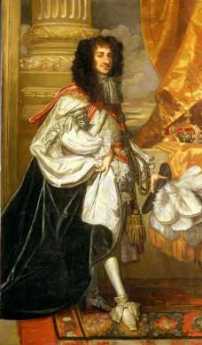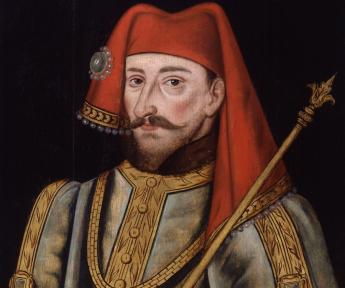Related Topics
Gardens Flowers and Horticulture
Gardening, flowers and the Flower Show are central to the social fabric of Philadelphia.
Litchfield to Wilkes Barre, Today
The journey of Connecticut's invasion path into Pennsylvania has changed little in two centuries. But some pretty important history has since taken place along that route.
The Pennamite Wars
The Connecticut farmers believed the King's last word overturned all earlier ones, else why be a king? William Penn's revolutionary idea was that of private property -- the first sale created a new owner, whose new word erased any earlier ones. When you acquire a new continent from aborigines, that's a congenial viewpoint.
Litchfield's Past

|
| King Charles II |
The state of Connecticut absolutely loathes the idea that it is influenced by neighboring New York City. But Greenwich is full of hedge funds escaping high taxes, unfortunately not by very much. New Canaan is what Greenwich used to be, a snooty New York suburb. And Litchfield seems destined to be next in line, but still able to deny it. It's charming, neatly manicured, but still affordable. Young investment bankers think of buying a weekend home there, which will become New Canaan or Greenwich by the time they retire, which on Wall Street is often sooner than they guess. Meanwhile, the restaurants struggle to present an upscale appearance. The local law school claims to be the first in America. In spite of civil appearances, however, this is the town that decided to invade Pennsylvania on three different occasions, provoking massacres of several hundred people. Litchfield derives from Lichtfeld, a place where heretics are burned. When those dreadful Baptists from Rhode Island made an appearance, the local Congregationalists were ready to take a stand. The borders of Litchfield once extended west to Wilkes Barre, but it is still puzzling to ask how these invaders crossed the Hudson and Delaware Rivers. Or how settler families marched through what is still pretty much a barren wilderness. All the while, telling themselves their destination was a paradise when even neighboring Scranton today looks down its nose at Wilkes Barre. What is this invasion trip like today, and why in the world would the Connecticut Yankees have changed it, three times?

|
| King Henry IV |
Those Yankees were almost certainly indifferent to the magnificent scenery offered the traveler of this path, especially when the fall foliage is awe-inspiring. George Washington's headquarters was to be located later at Newburgh for longer than at any other place, and thus it became the first national park monument in the country, lying across the path of the largely forgotten invaders. Unfortunately, hardly anyone even today in Connecticut knows what was notable back then, or cares to learn. Connecticut may make its living on Wall Street, but in a spiritual sense, it faces Boston. Curators at the National Park at Newburgh likewise know nothing of the Pennamite Wars. Restaurants have difficulty summoning up a hamburger; the motorist must pump his own gas. But there are clues; at least six different towns along the invasion route call themselves Milford, or New Milford, or similar. The postal service frowns on using the same name twice in a single state, else surely there would be more Milford. There are other clues. Near the end of the trip to the Wyoming Valley, can be found the "Promised Land Park". It's just past a place called "The Lord's Valley". Not far away can be found in the town of Dallas. Just why did Wilkes Barre name so many things after other places far away?

|
| White Flower Farm |
Perhaps the law school has something to do with it. Charles II of England had given Connecticut all the land to the Pacific Ocean when it was all wilderness that just about nobody wanted to own. Eighteen years later, the same king gave the same land to William Penn. Any modern lawyer, and maybe those backwoods lawyers three centuries ago, would tell you that if the King gave it away, it was no longer his. But Penn went to court with the complaint that the present king had just given it to him, and the court agreed that Penn could call the Sheriff to throw the Connecticut people out. Modern citizens would suspect bribery or other foul play, and perhaps the Yankees did, too. After all, ancestors of that King had badly mistreated some of their ancestors, so perhaps he held a grudge. Unfortunately, that's not how the law saw things at the time, and it's not entirely likely the Connecticut Yankees were being calm and straight about it. The fact was that Connecticut farmland never had much topsoil, and by this time it was worn out. Population growth pushed, and some fanciful tales of Wyoming (now Wilkes Barre) Valley's abandoned richness, pulled. They needed it, they wanted it, no one else was using it, the owner was already rich enough, and -- King Charles, that rascal, had given it to them.
The Connecticut Yankees liked to read books, so let them read Shakespeare. The so-called Henriad, those four plays concerning Henry IV and V in the 15th century, describes accurately how the King of England owned the whole island, by inheritance and by force of arms. Those nobles who followed him and brought along enough troops to win battles were each given a piece of the kingdom. But if, as quite regularly happened, one of the nobles betrayed or displeased the King, he lost his head, and his land was given to someone else. That's what it meant to be the King, and that's still largely the way it was in the Seventeenth, even early Eighteenth, century. It's true the Barons forced a king at Runnymede to obey the laws himself, Parliament asserted itself in the Sixteenth and Seventeenth centuries, the open country began to be enclosed for private ownership in the Eighteenth century -- and the fellow colonists in America would ultimately break loose from England to extend these property rights further, until in 1787 the Constitution made it final. But that's a long way from saying King Charles II couldn't do what he pleased at the time he did it, and how many girlfriends he happened to have was irrelevant to the case. William Penn was a better lawyer than anyone in Litchfield and won the case every time it came up.
And furthermore, the Connecticut folks were out of step with their friends. Eleven of the colonies were fighting for independence, and George Washington was not alone in despairing that the other two colonies were fighting, not the British, but each other. Litchfield may now have the most beautiful flower farm market in America, but at the other end of the same street, the professional forebears of the Litchfield Law School were once giving poor advice.
Originally published: Wednesday, September 01, 2010; most-recently modified: Thursday, May 23, 2019